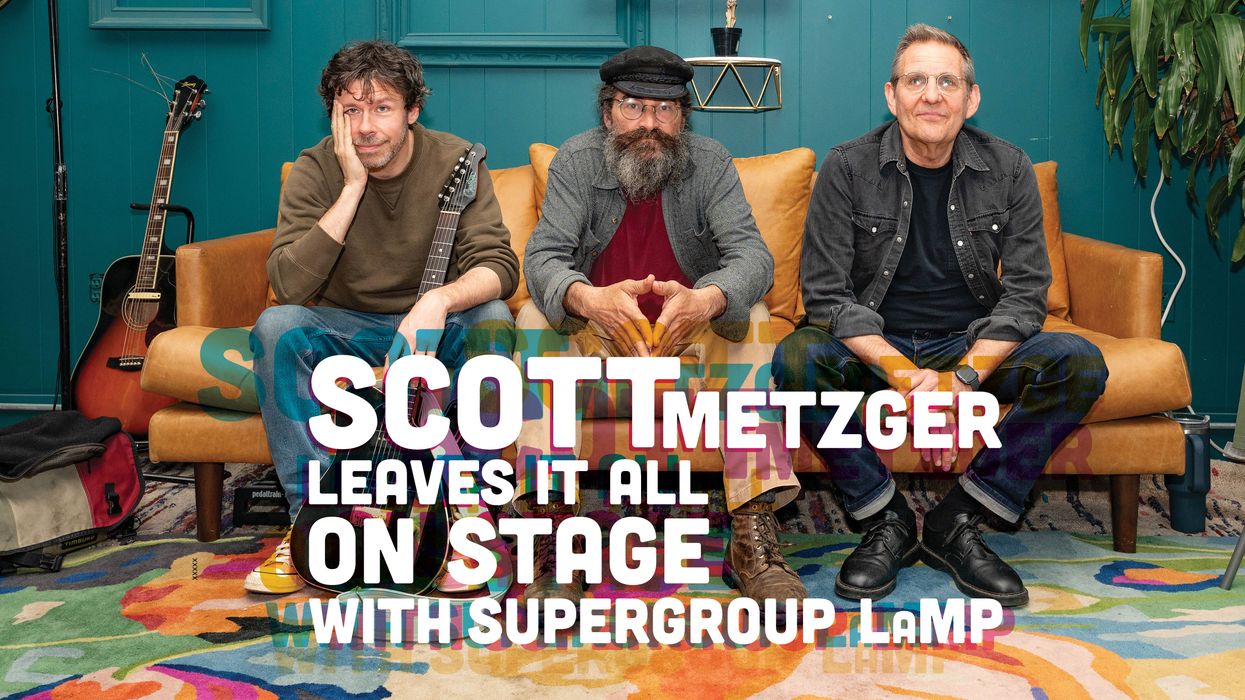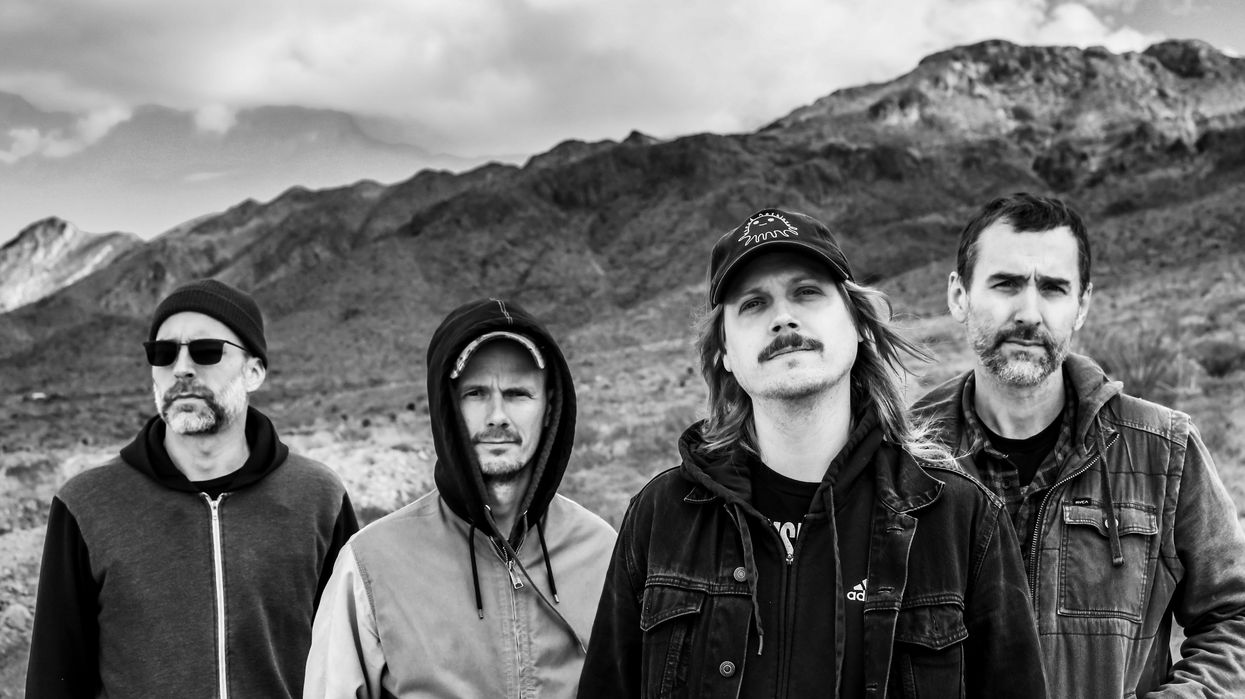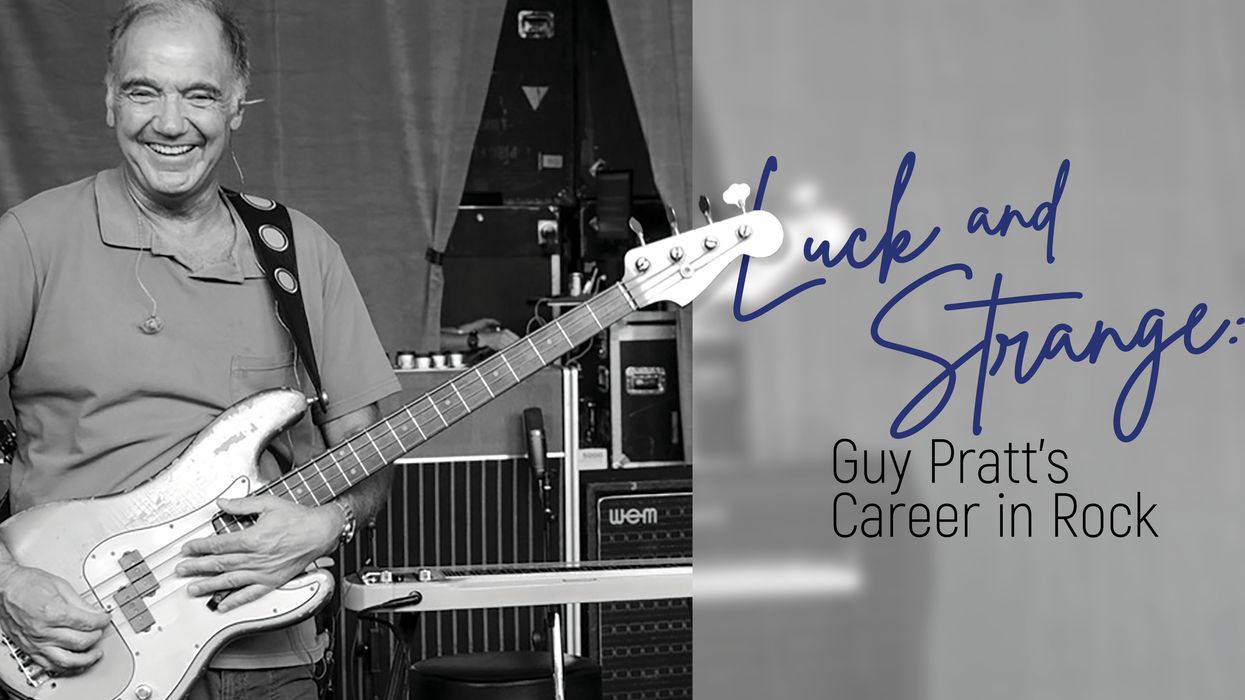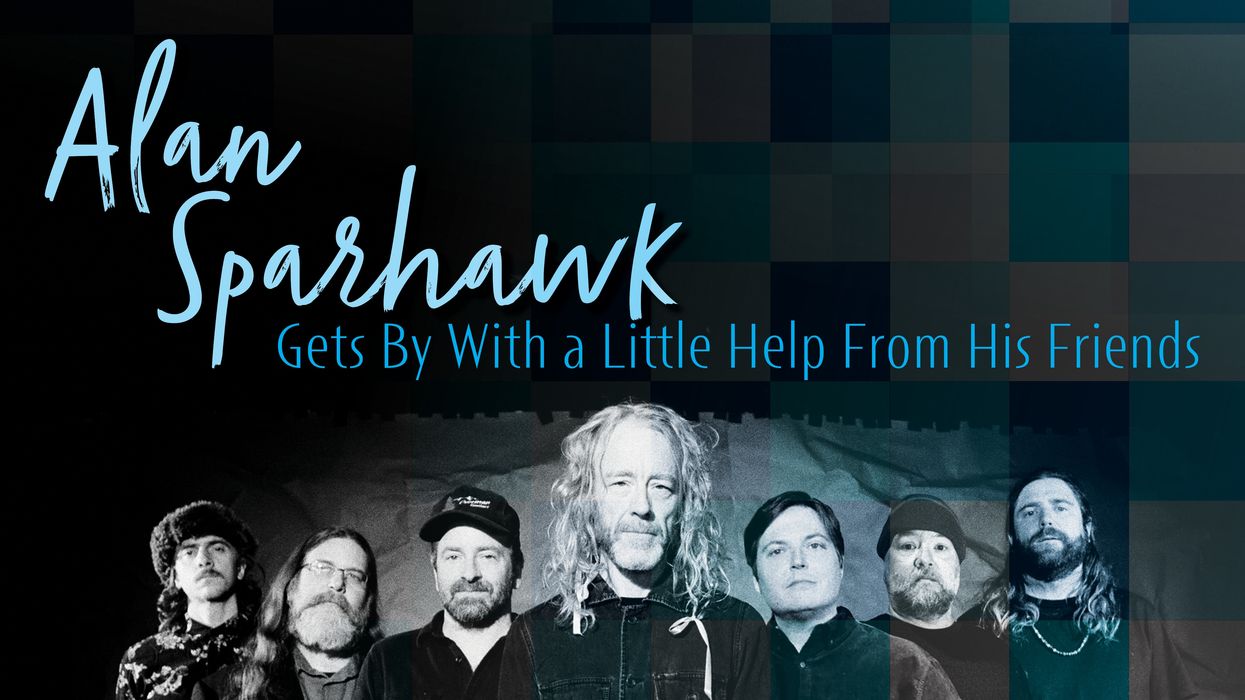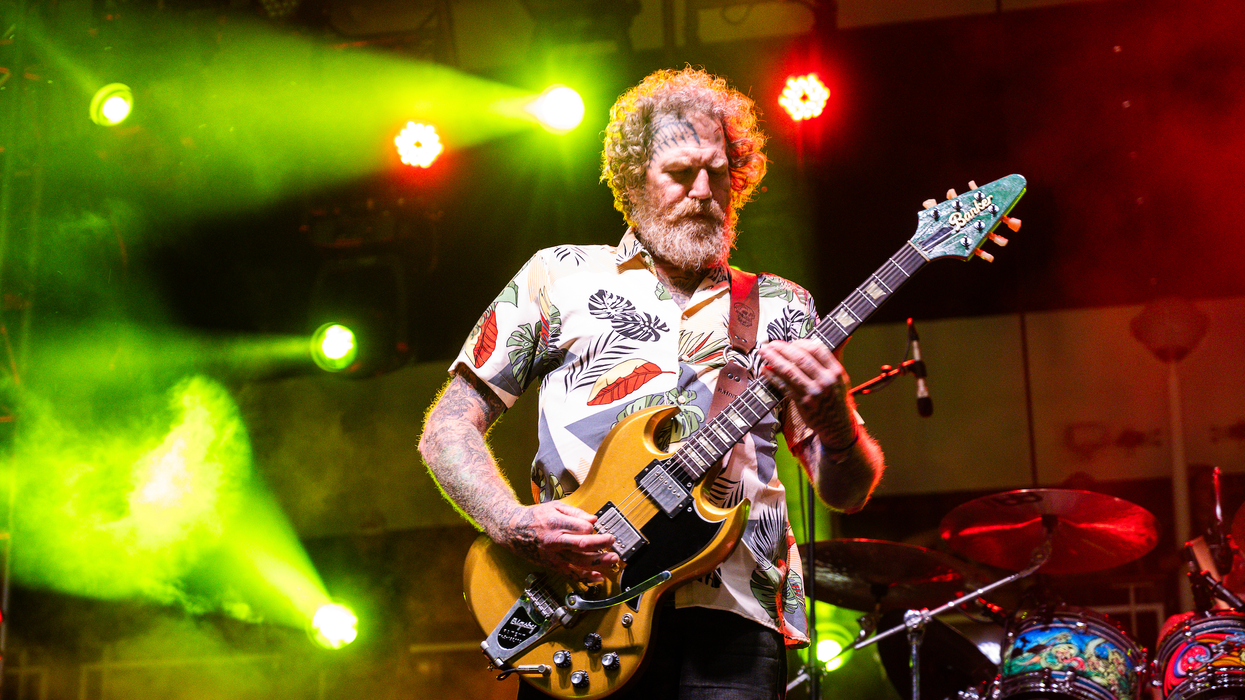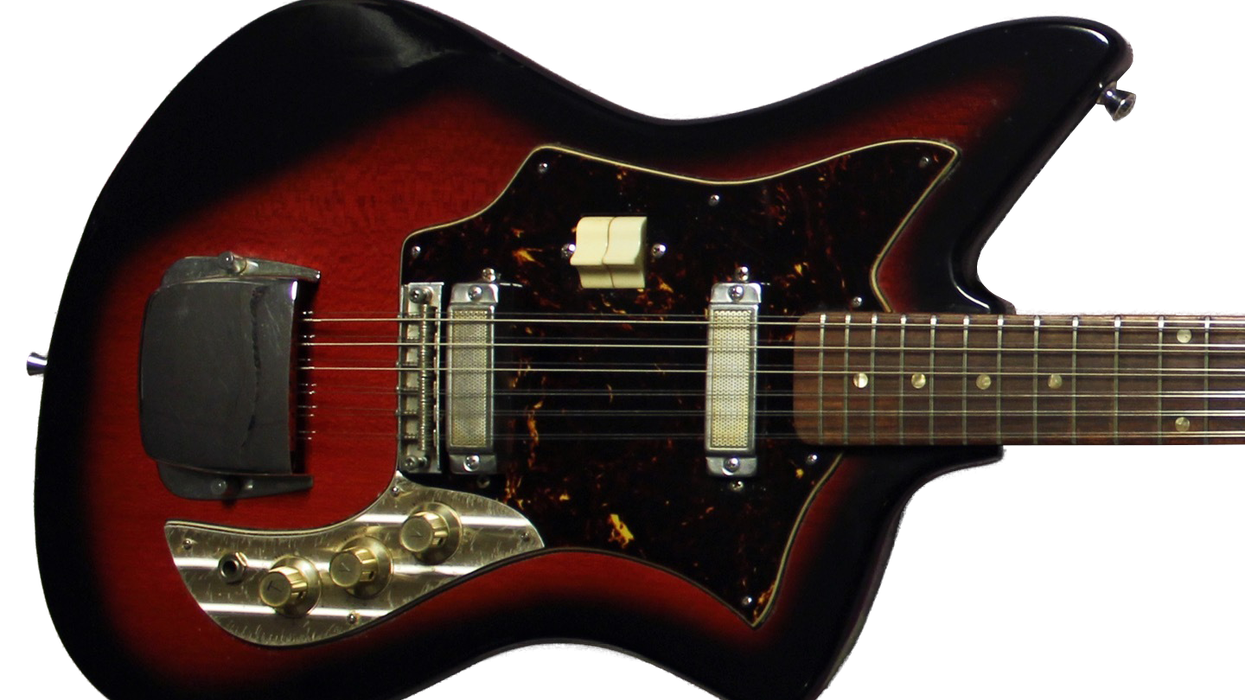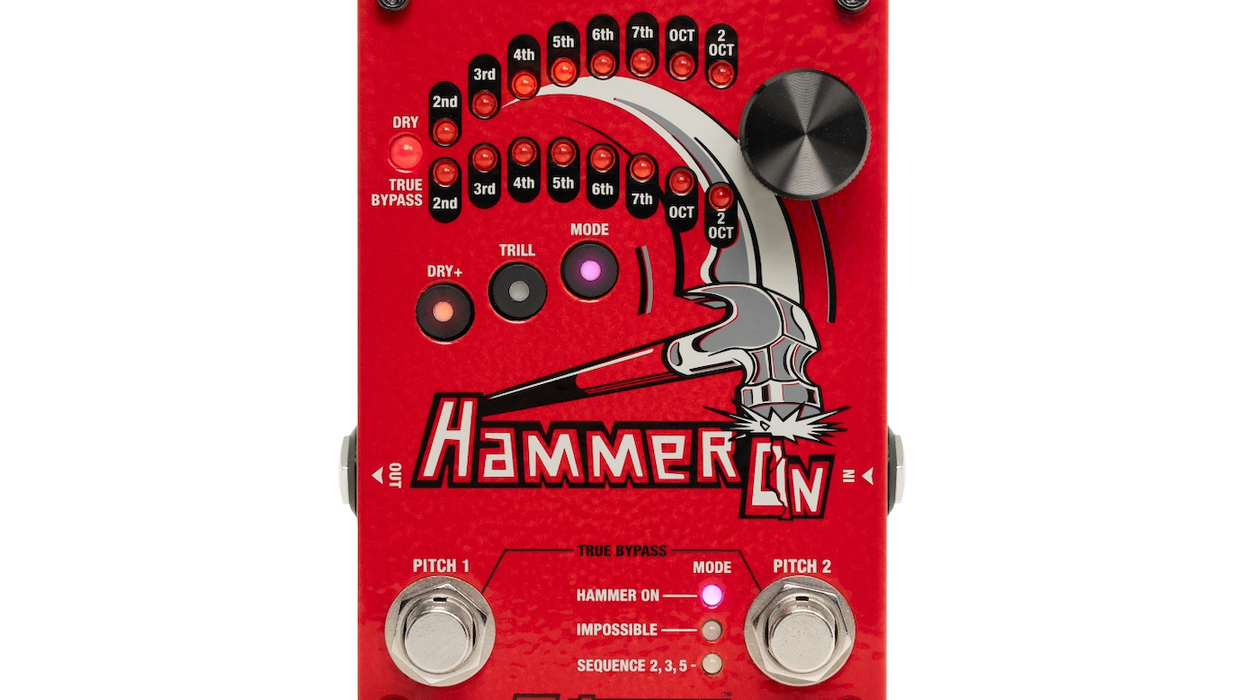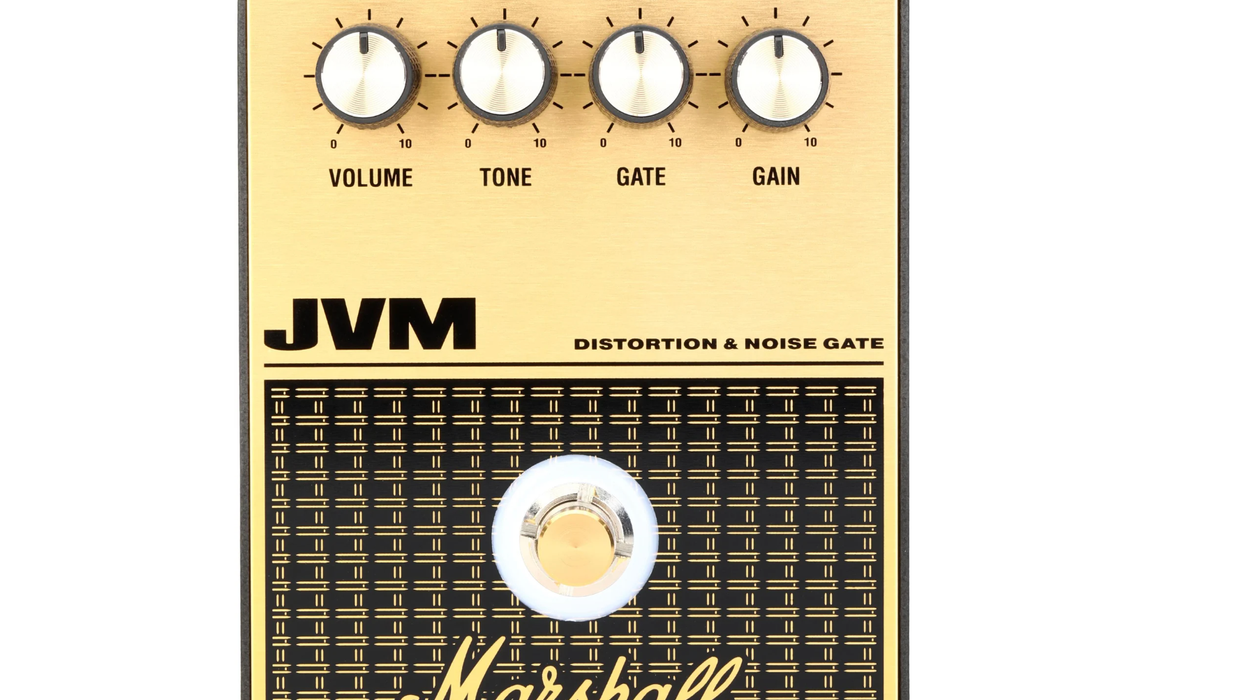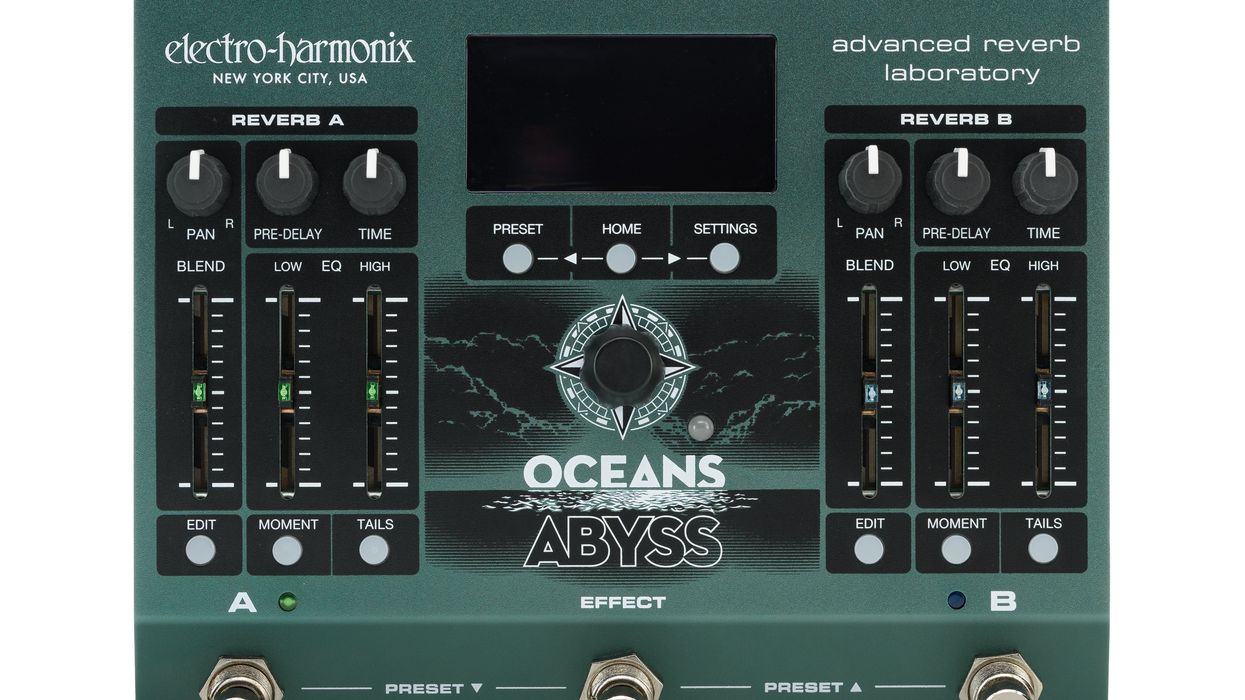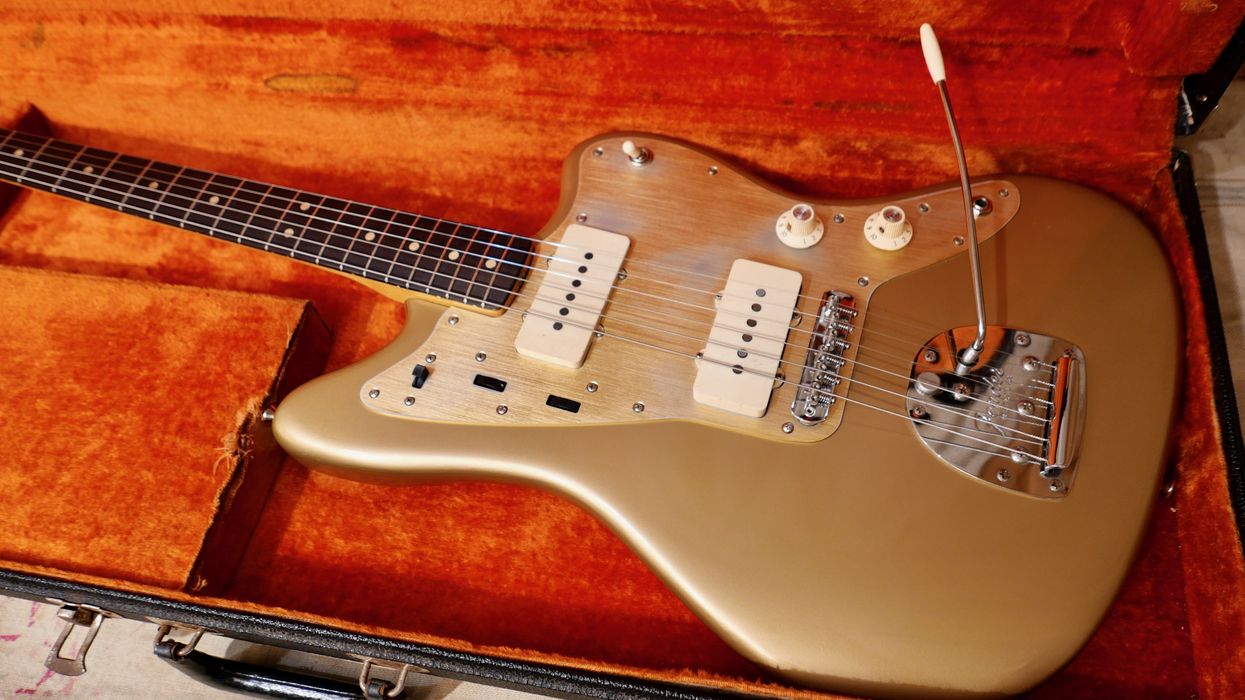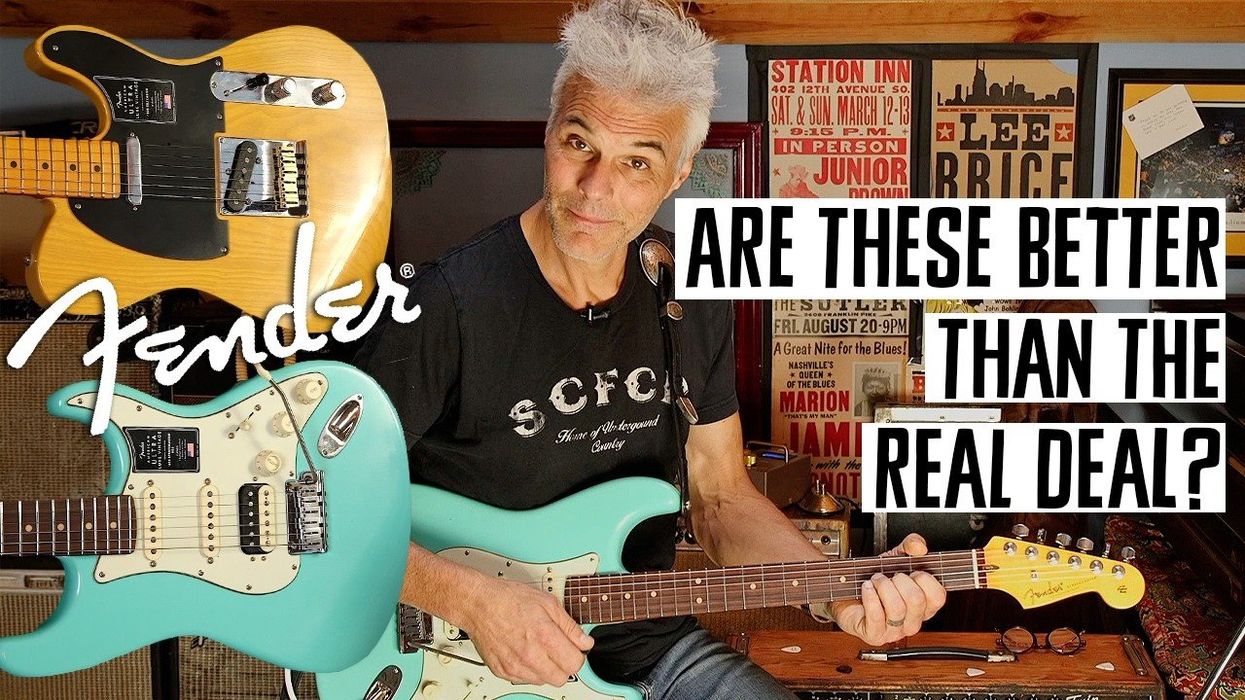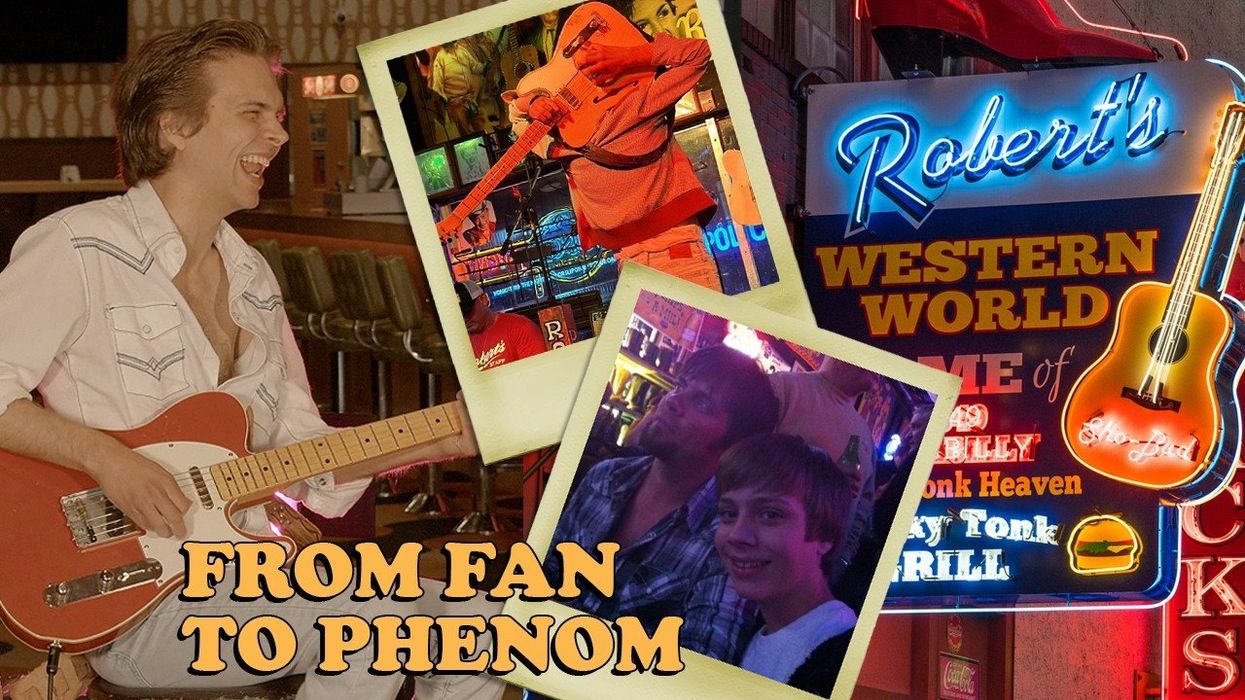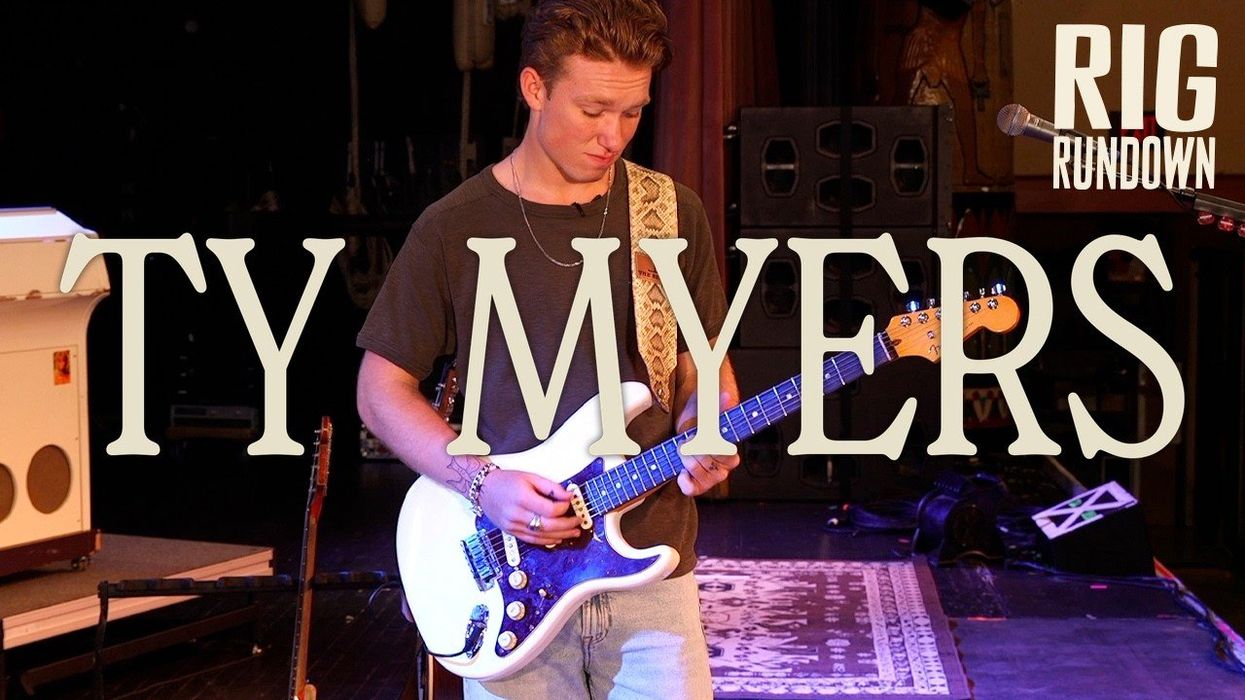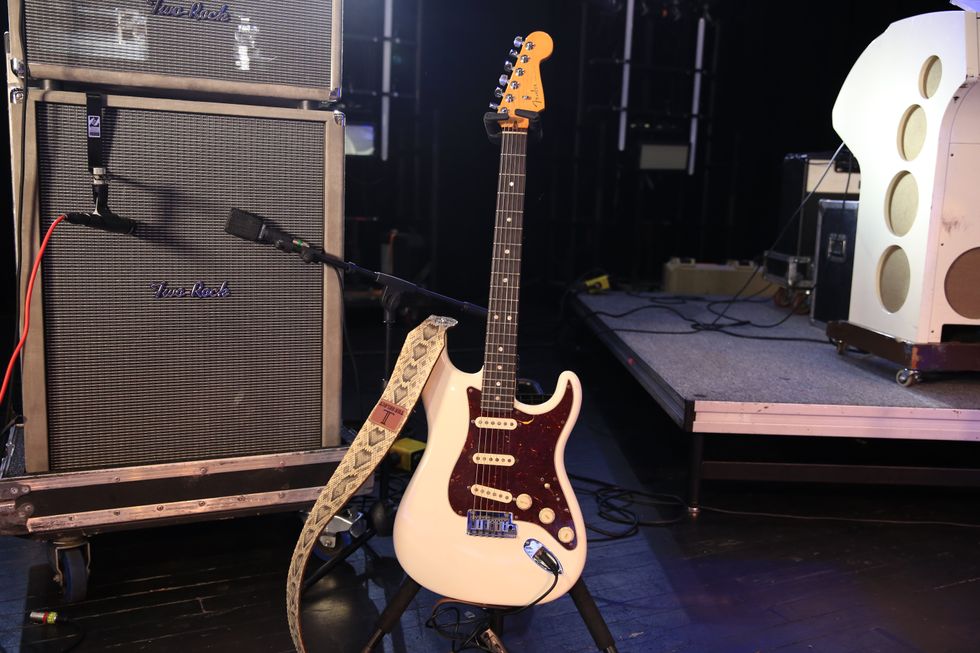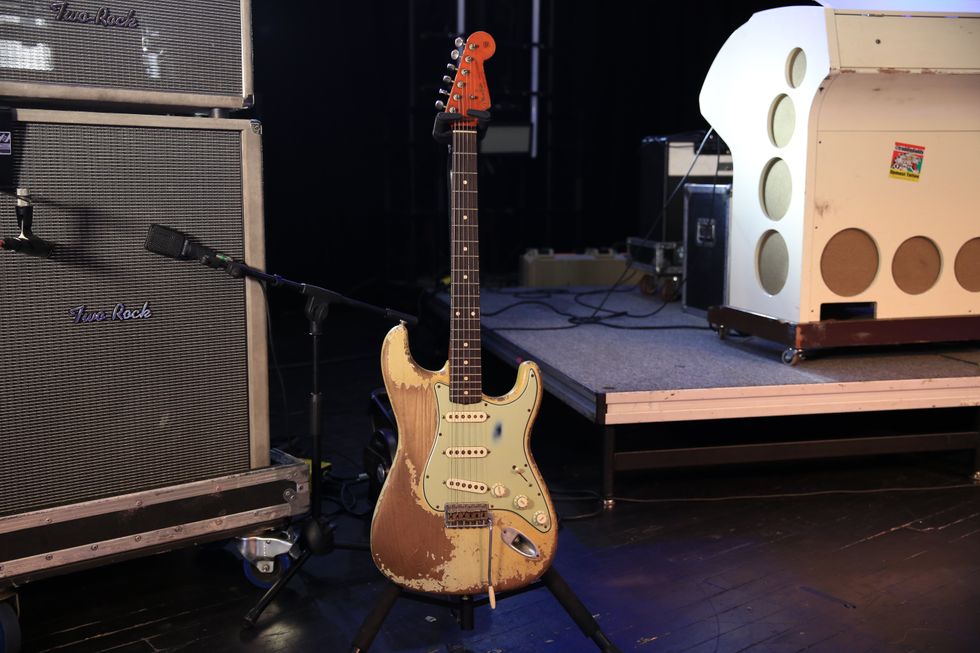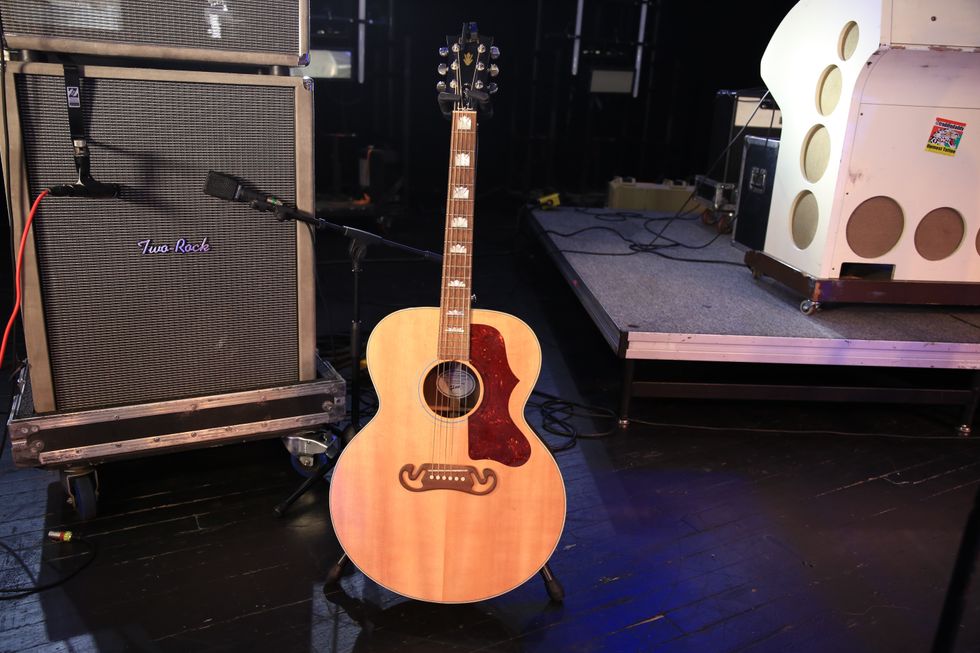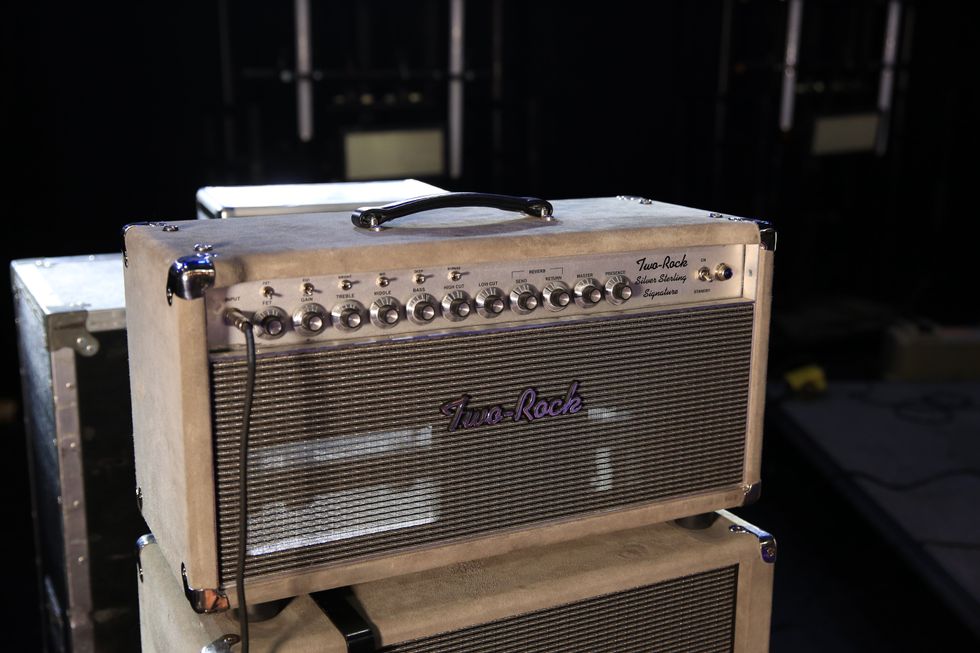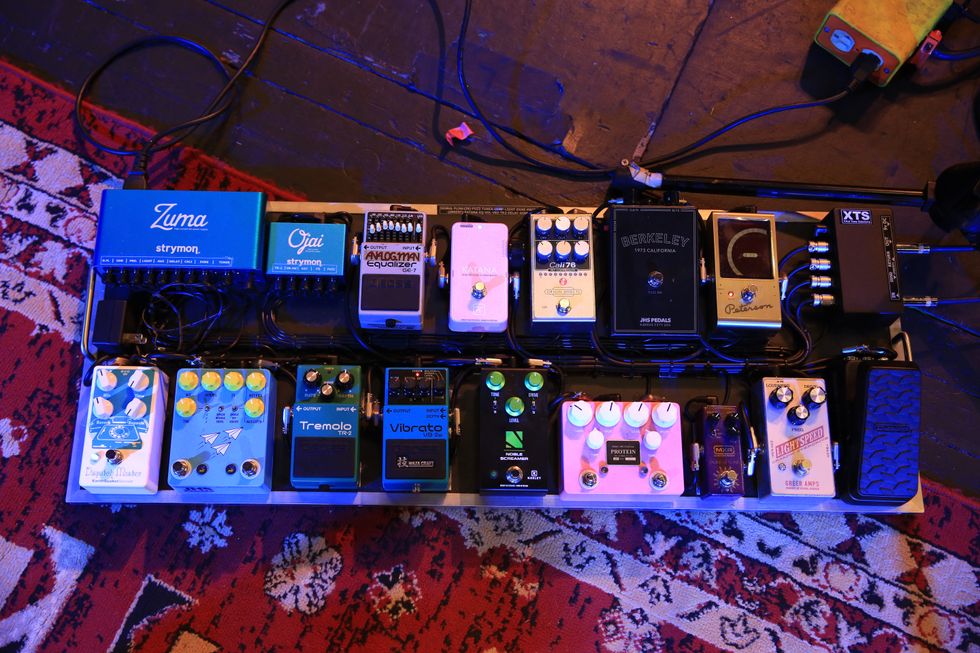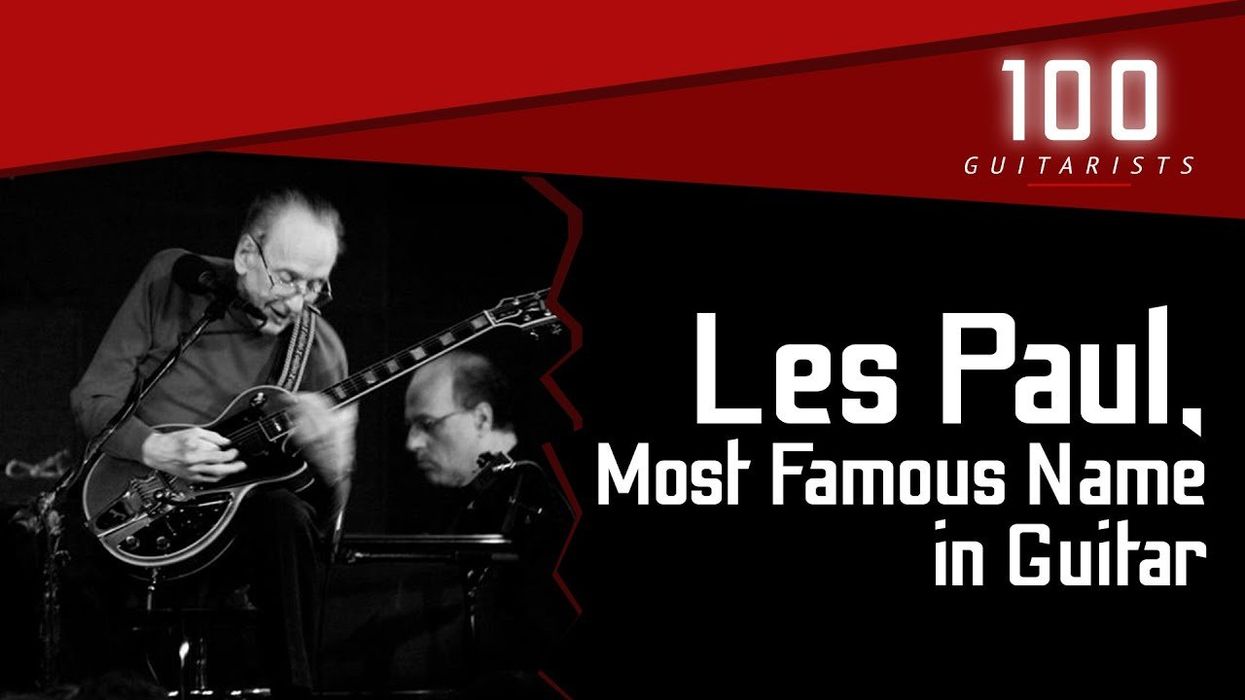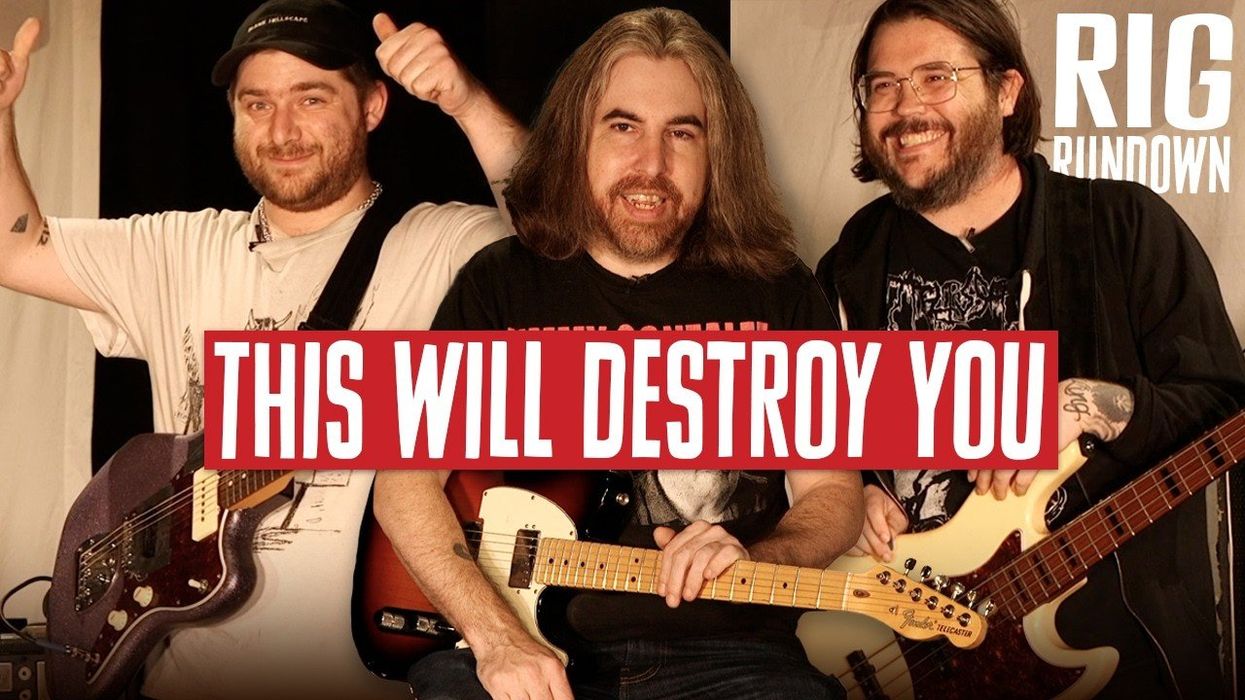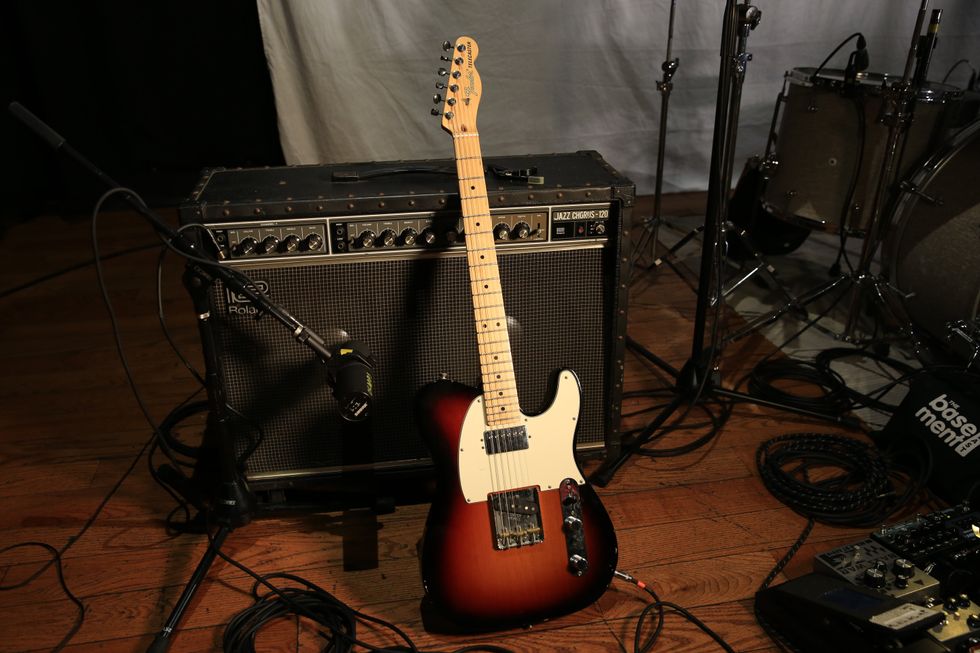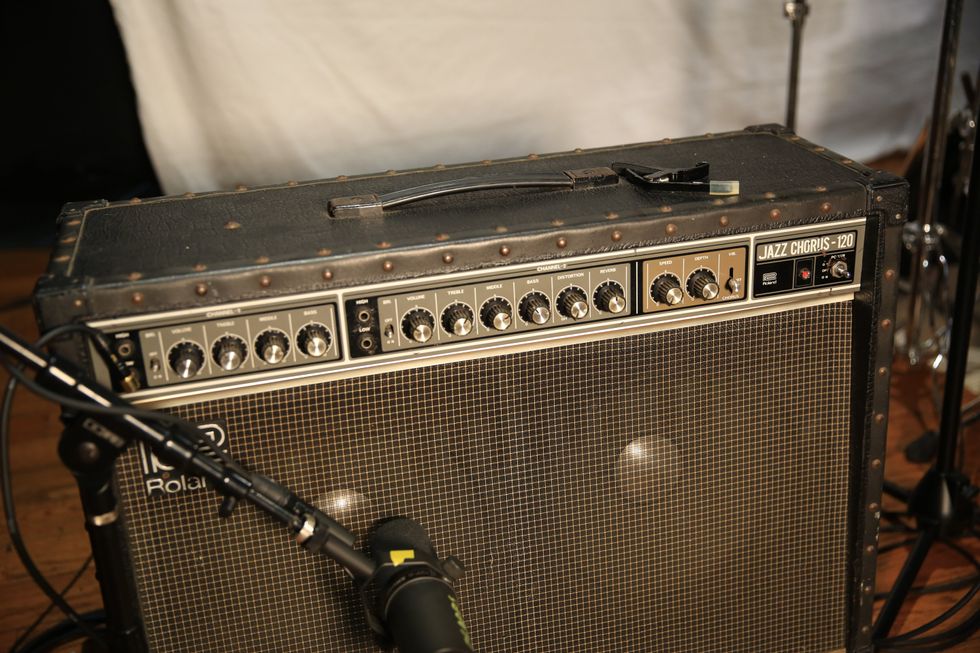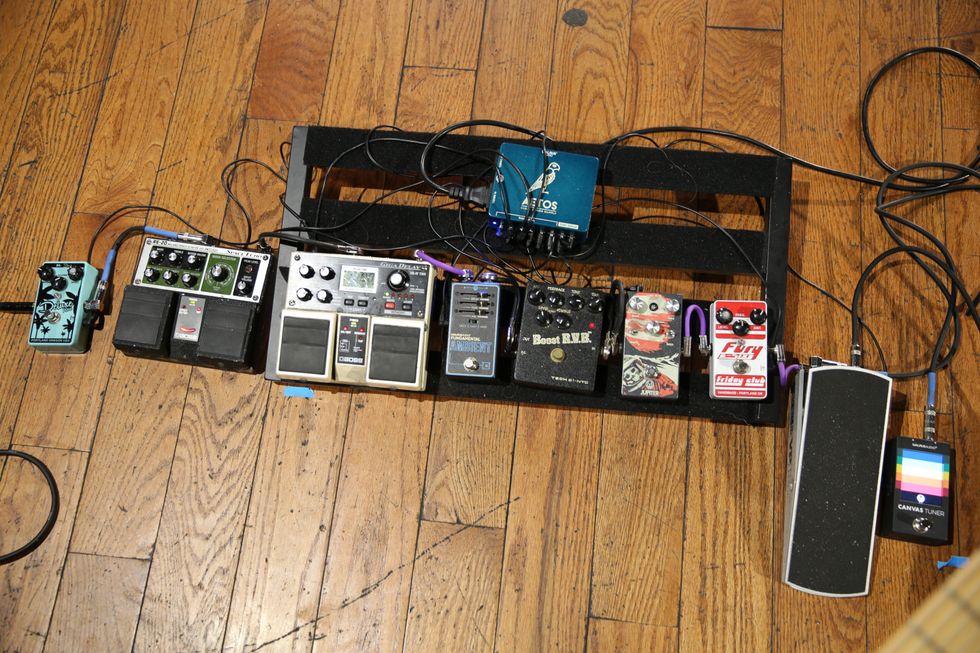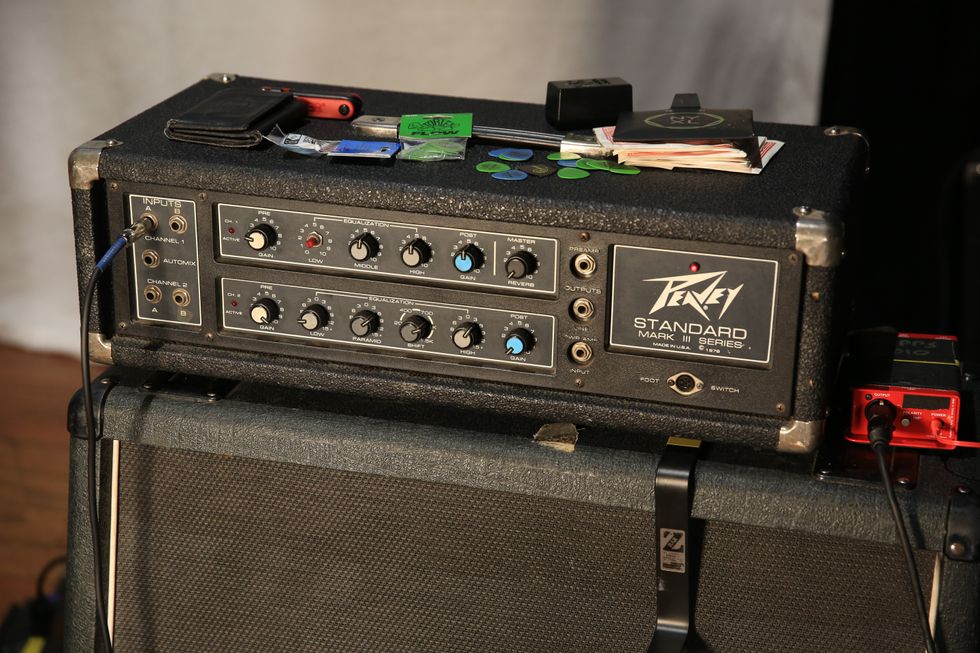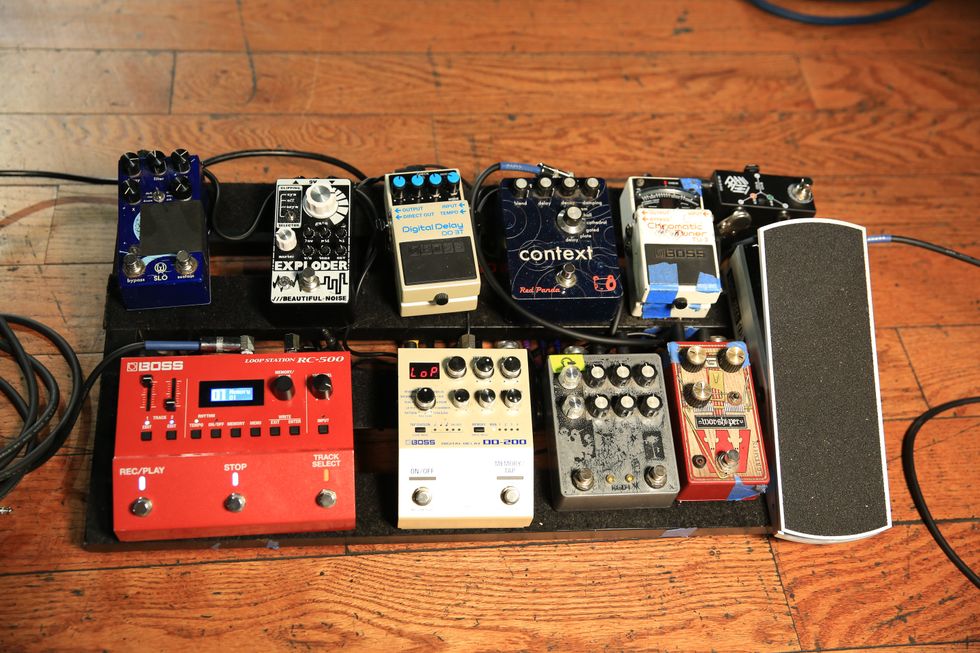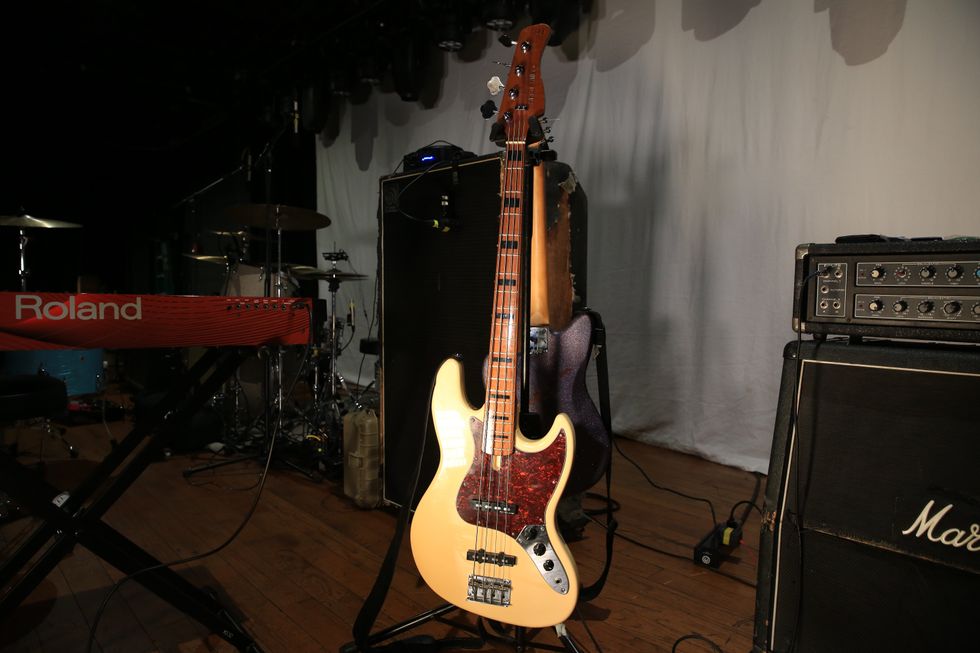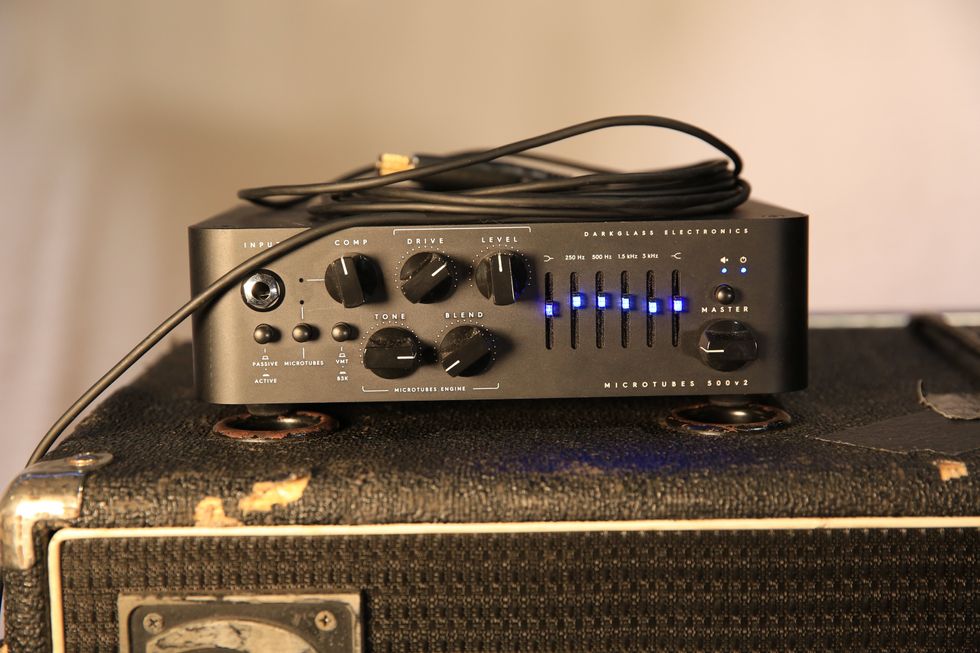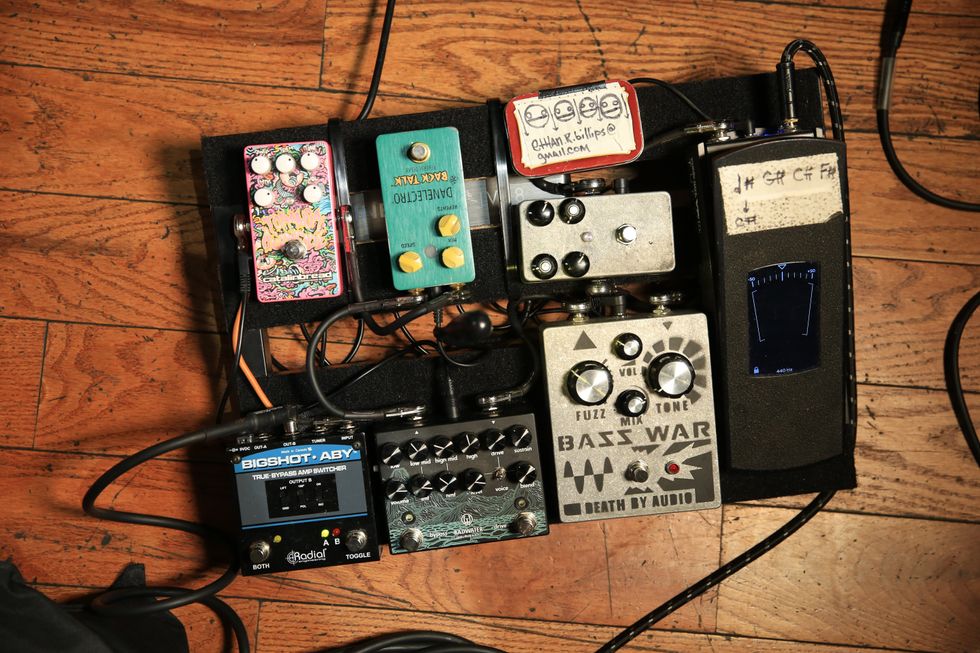“Night after night playing next to Dean Ween was really my foundation for learning what it means to be a lead guitarist, and how to do a gig, and the pacing of a gig, and a lot of things that I still consider really, really important lessons,” says guitarist Scott Metzger. He’s thinking back to his formative years in the small town of New Hope, Pennsylvania, about 40 miles north of Philadelphia and across the river from his hometown of Lambertville, New Jersey. It was there, on the intimate, low-ceilinged stage at eclectic musical outpost John & Peter’s, that the guitarist cut his teeth next to the Ween co-founder—real name Mickey Melchiondo—as a member of Chris Harford’s Band of Changes, which Metzger joined at just 17 years old.
“They treated me like a kid, man,” he continues. “They really put me through the paces. There was a lot of hazing, and there was some tough love on a lot of those nights.”
Metzger estimates he left it all on the John & Peter’s stage hundreds of times, forming an old-school style of musical apprenticeship that can be heard in his playing today, three decades later. In any of the improv-heavy settings where he tends to find himself—such as his collaborative trio, LaMP, with members of the Trey Anastasio Band, the transformative Grateful Dead tribute Joe Russo’s Almost Dead, or in freelance situations—Metzger takes the patient and complementary approach of someone playing the long game. He’s a supportive and colorful collaborator who, to make a baseball analogy, always seems to have a good read on the musical ball, equally adept as a finely attuned rhythm player or commanding lead voice. For that, he offers a lot of credit to those early days.
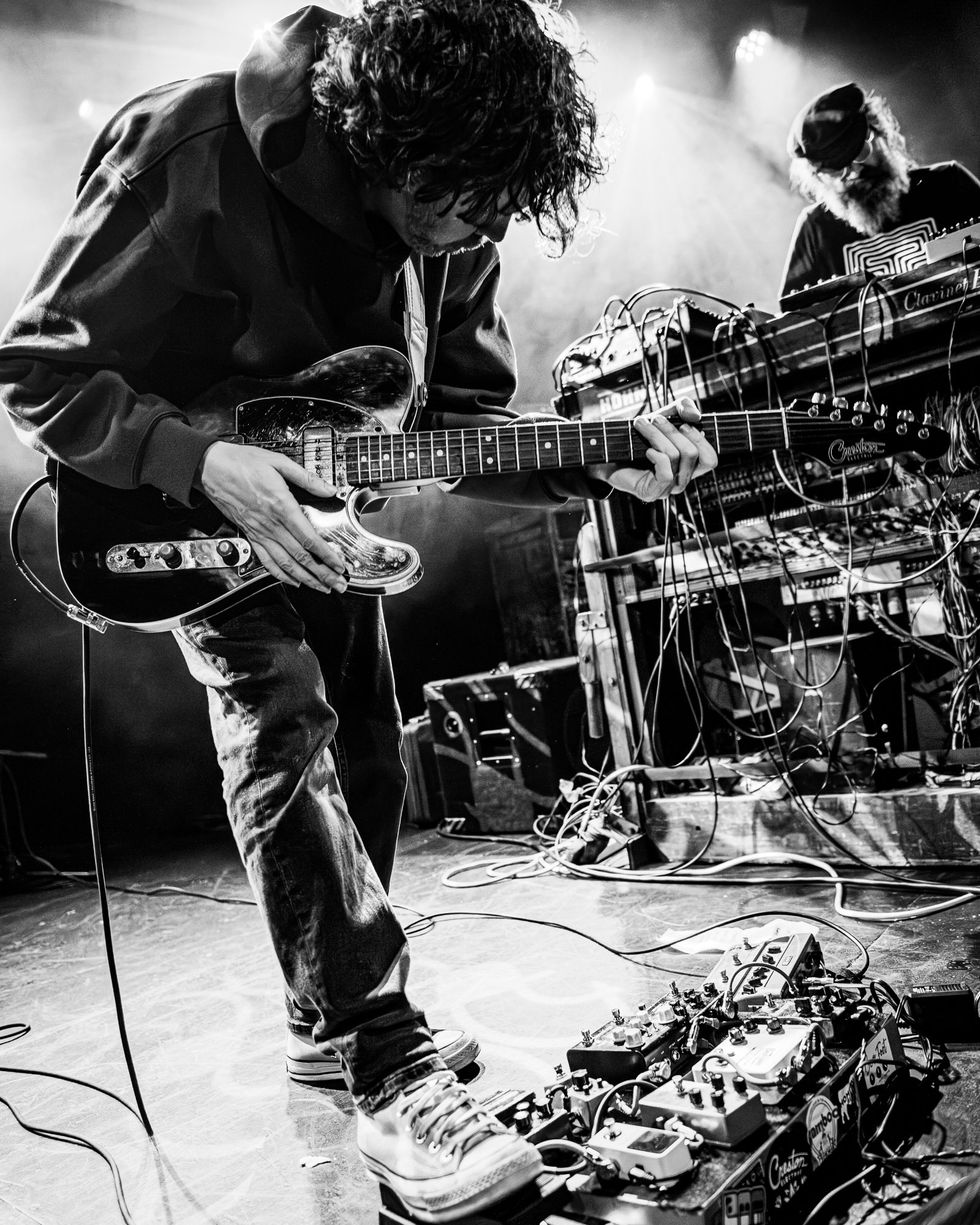
Guitarist Scott Metzger and his Lollar P-90-loaded Creston T-style onstage with LaMP, next to organist Ray Paczkowski.
Photo by Andrew Blackstein
“I kept my mouth shut and my eyes open,” Metzger explains, “and I learned what it takes to become a good, competent guitarist and what it means to have a distinct voice—Dean Ween has one of the most distinct lead guitar voices in rock ’n’ roll as far as I’m concerned. But not only that, also how to support a singer, and how to play a song, and when not to solo, which is just as important as knowing when to.”
Metzger remembers his early teen years, learning tunes by the Ramones—his first concert—and Jersey’s own Misfits, and getting turned onto Hendrix bootlegs and Boredoms records at New Hope’s Now and Then shop. Later, Melchiondo expanded his psychedelic worldview, hipping him to P-Funk— specifically Eddie Hazel’s guitar work—and the Allman Brothers.
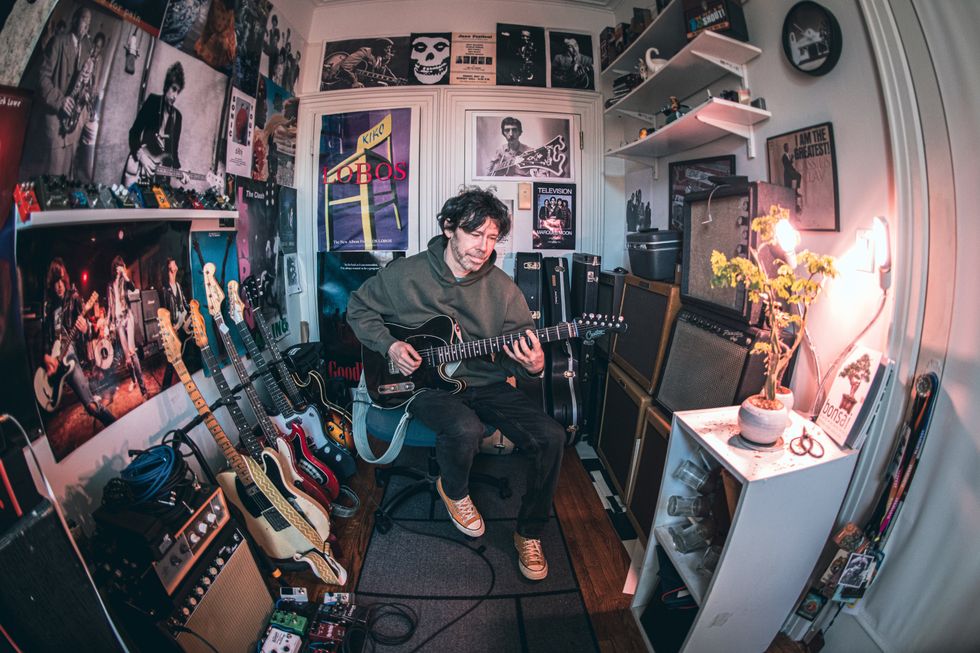
Metzger at home in Brooklyn, surrounded by an inspiring array of gear and posters.
Photo by Andrew Blackstein
It wasn’t long until Metzger put all those early lessons to work on the road. At 19, he was playing with his experimental trio F-Hole at Princeton, New Jersey’s Small World coffee when Phish guitarist Trey Anastasio wandered in. “As soon as we get done playing,” Metzger recalls, “he makes a beeline to me and basically started interrogating me about who I was listening to and what I was into gear wise and what kind of guitarists I was into. What I didn't realize was that he was basically auditioning me in real time to be in his friend Tom Marshall's band, who writes all the lyrics for Phish and was putting together a band at the time.”
Metzger scored the gig with Marshall’s Amfibian, playing sold-out shows on the road and opening him up to a whole new musical world. “I wasn’t that familiar with Phish at all,” he points out. “But I knew I liked being up in front of all those people and being able to just play all night. I was really kind of a focal point of the band, and that was my introduction to what is now considered the jam band scene.”
Fast-forward to the present: Metzger is a formidable member of the jam scene. He’s led and collaborated on a host of projects, including WOLF!, with bassist Jon Shaw and drummer Taylor Floreth; the blazing country-swing trio Showdown Kids, with his wife, violinist Katie Jacoby, and guitarist Simon Kafka; and his resplendent, forward-thinking 2022 acoustic-focused solo record, Too Close to Reason. In 2013, he teamed up with his longtime pal drummer Joe Russo, along with guitarist Tom Hamilton Jr., bassist Dave Dreiwitz, and keyboardist Marco Benevento, in forming Joe Russo’s Almost Dead. Colloquially known as JRAD, the group, in a sea of reverence, treats the Grateful Dead’s songbook almost as if it’s an edition of the Real Book—the shorthand jazz-standards tome—cracking open the large catalog and infusing their own voices with every improv-heavy performance.
Scott Metzger’s Gear
Guitars
- Creston T-style
- Ronin Songbird
Amps
- Headstrong Verbrovibe 1x15
- Victoria 35210
Effects
- Bearfoot Putting Green Compressor
- Benson Germanium Fuzz
- Paul Cochrane Timmy overdrive
- Interstellar Audio Machines Octonaut Hyperdrive
- Analog Man-modded MXR Phase 90
- Ibanez Analog Delay
- Keeley 30ms Double Tracker
- Benson Delay
- Wilson Wah pedal
- Line 6 DL4
- Voodoo Lab power supply
Strings and Picks
- D’Addario NYXL .011s
- Dunlop Prime Tone 1.0 mm
Being a part of a Dead tribute act was never part of Metzger’s plan. In fact, he says he wasn’t all that familiar with the band’s catalog. “I wasn’t sure I was the right guy for the band,” he says. But with exploration and personal vocabulary so paramount in JRAD, Russo knew Metzger was the right guitarist for the job.
“You have to be willing to get in there and do your thing and make your mark unapologetically,” Metzger muses. “That's something that's made us stand out in a world of bands that are playing those songs.”
JRAD has developed a large, dedicated following, rising to the top of the Dead tribute scene. “The size of the audience that we have is mind blowing,” Metzger points out, “and the fact that the audiences are willing to go to the places musically with us that we take it, it almost feels like we're testing how much we can get away with a lot of the time.”

Metzger and LaMP bandmates Paczkowski and drummer Russ Lawton. “Those two guys are kind of celebrities up in Burlington,” he says, “so it's like doing a gig with the mayor or something.”
Photo by David Gray
These days, JRAD makes up about half of Metzger’s current gig commitments, and LaMP fills the other. The trio was formed one night in 2018 at Burlington, Vermont’s jam nexus Nectar’s, when the guitarist joined forces with keyboardist Ray Paczkowski and drummer Russ Lawton, both longtime members of Trey Anastasio’s solo band, who also work as the psych-funk duo Soul Monde. “Right off the bat, there was a chemistry that was going to work,” Metzger recalls. “Those two guys are kind of celebrities up in Burlington, so it’s like doing a gig with the mayor or something. The whole town came out to see us, the place was packed, and I think it was very clear to everybody there that night, including us, that it would be a crime not to do it again.”
LaMP builds on the long history of the organ-trio tradition, referencing ’60s ensembles helmed by Grant Green and George Benson, the Meters’ soulful funk, more modern jammers like Medeski, Martin & Wood—and most notably their late-night groove collabs with guitarist John Scofield—as well as thrill-seeking, forward-leaning groups like John Abercrombie’s Gateway Trio and Tony Williams’ Lifetime, all while embracing the spirit of rock ’n’ roll abandon. As unabashed and freewheeling as that might suggest, Metzger and company shoot for a tasteful sonic experience more than a barn-burning blast-off, and at the fore of the band’s sound is a shared improvisational language built upon close listening just as much as any influence. “The real thing that we’re focusing on,” Metzger shares, “is having a good feel, a group sound, and some catchy melodies. Those things are enough to carry the thing without having to worry about ripping some blazing solos every song.”
This year, LaMP released One of Us, the follow-up to their self-titled 2020 debut. It’s filled with live-off-the-floor energy, or as Metzger puts it, “fresh tension.” The mostly first and second takes heard on the record, with barely any overdubs, successfully capture the band’s collaborative heart, making One of Us a ferociously spirited listen from beginning to end. “I like records that are made really quickly on low budgets with the clock ticking,” Metzger conveys. “You can feel that a little bit on the record. It’s not too polished. It's like you can feel that it’s three guys in a room playing together.”

LaMP’s One of Us captures the band’s effervescence with a set of mostly live-off-the-floor first and second takes.
Throughout One of Us, Metzger showcases his deep fluency in the Telecaster vernacular. With his Creston T-style, a chambered all-black affair loaded with Lollar P-90s, he slings lyrical licks that offer nods to the masters of the form, all the way back to the first Tele virtuoso, Jimmy Bryant through aces Roy Buchanan, Danny Gatton, Jim Campilongo, and Steve Cropper’s deep pocket. (In JRAD, Metzger calls on a Ronin Songbird loaded with DeArmond gold-foils, but his vocab and approach remain much the same.)
Metzger’s take on the tradition is less virtuosic gunslinger than most of those maestros, instead favoring a more complementary approach with an ear toward supporting the group. To that end, he keeps his sound mostly on the cleaner end by reserving a load of potential sonic energy. “I crank the amp,” he says, pointing out he prefers to set his combo—either a Victoria 35210, a 2x10 Fender tweed Super copy, for LaMP, or a Headstrong Verbrovibe 1x15, a replica of a 1963 Fender Vibroverb, which he favors for JRAD—to 7 or 8 so it’s fully opened up. A self-described “minimalist pedal guy,” he keeps four punch-packing pedals—a Bearfoot Putting Green compressor, Benson Germanium Fuzz, Paul Cochrane Timmy, and an Interstellar Audio Machines Octonaut Hyperdrive—on at all times. As hairy as that may suggest, Metzger maintains clarity, he explains, by keeping his guitar volume set between just two and four. That means that when he wants, he’s just a crank of the volume knob away from a wide-open, full-throated sound.
YouTube It
LaMP deliver the knotty mid-tempo groove of “Jasper’s World” from One of Us from a concert in fall 2024 at Boston’s Wilbur Theater.
His approach to pedals says much about Metzger’s playing style in general. There’s always a load of possibility on reserve, and you can sense it. He’s not one to frequently lay sonic waste with a technical assault, but, rather, a massive map of potential musical avenues is perpetually close at hand, with his ear in the driver’s seat.
Listen to Metzger in just about any situation, whether as a bandleader, bandmember, or just sitting in, and there’s an obvious musical set of ethics in place—and it’s probably been in effect since his early days at John & Peter’s. The responsibilities are something like work hard, support others, be ready to deliver at all times, and, maybe above all, be yourself.
“I was told in no uncertain terms,” he recalls, “that the important thing about being a musician was to find your own thing. You’ve got to stand on your own feet. The ultimate goal that we’re all still working on is to sing our own song with our own voice.”
